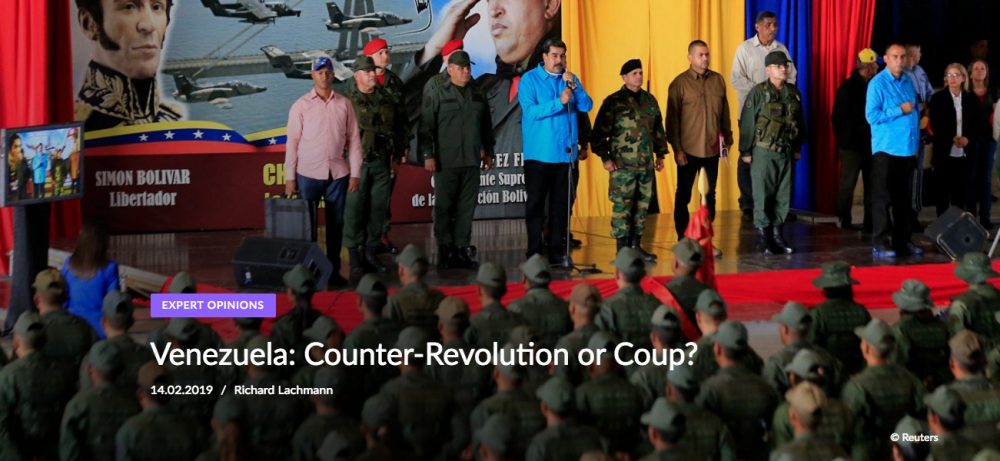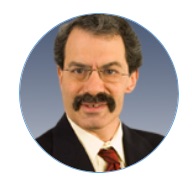
Venezuela is now a nation in the crosshairs of the empire, at its most vicious, cynical and impudent. Nothing good will come from US meddling in Latin America. It never has. So the only question is how much suffering and destruction will Venezuela have to endure before the empire is stopped (technically it cannot be defeated), or the indolent American public finally wakes up enough to restrain their criminal rulers.
Venezuela has two presidents, or at least two men, both with committed supporters who accept their claims to be president. Nicolas Maduro was appointed Vice President by then Venezuelan president Hugo Chavez in 2012. Maduro became president the following year when Chavez died of cancer, and was narrowly elected to a full term a month later. Juan Guaido has claimed that Maduro is not the legitimate president because he stole his last election and therefore Guaido as president of the National Assembly is, in fact, the acting president.
[dropcap]M[/dropcap]aduro’s reelection in 2018 was much more controversial. Maduro changed the date of the election twice, and his control over the National Electoral Council led opposition parties to contend that the vote would be fraudulent. Opposition parties were justified in that belief by Maduro’s imprisonment of some opponents and his manipulation or outright theft of gubernatorial and legislative elections in previous years. The opposition parties and a large majority of voters boycotted the election, allowing Maduro to win by a wide margin.Despite characterizations of Maduro as dictatorial, the 2015 election for the National Assembly resulted in a victory for the main opposition party, which gained control of almost two-thirds of the seats. The opposition is a coalition of parties that decided to rotate the presidency of the National Assembly among them. In December 2018 it became the Voluntad Popular (National Will) party’s turn. Its senior officials for various reasons did not or could not take the Assembly presidency so it fell to Juan Guaido, who earlier had been active in extreme rightwing and sometimes-violent political groups.
Guaido skillfully recast his image as a social democrat, and has been able to unify most of the opposition parties behind his claim to the presidency. He justifies that claim by arguing that Maduro’s 2018 election was fraudulent and therefore the office of president is vacant, and when the office falls vacant the President of the National Assembly (Guaido) becomes acting president until a new election is held.
Guaido has gained support from foreign governments, above all the United States. The U.S. was the first to recognize Guaido as president of Venezuela and has enticed and prodded other countries to also recognize Guaido as president. It is a mistake to see the U.S. as merely responding to mass mobilization and divisions in Venezuela. The student movement from which Guaido emerged was financed and guided by the U.S. Maduro was targeted by the U.S. at the beginning of his presidency, both when he took office after serving as Vice President and after his first election which was generally seen as legitimate. Indeed, the U.S. backed various opposition groups when Chavez was president even though he repeatedly won elections and was widely seen, even by many of his opponents, as popular and legitimate. Chavismo, Chavez and Maduro’s policies of providing social services and income subsidies to the poor and workers while limiting the power and wealth of elites and big corporations, remains highly popular.
Most significantly, the U.S. has imposed sanctions and other less overt challenges on Venezuela. Sanctions, combined with the sharp decline in oil prices and Maduro’s widely acknowledged incompetence in managing Venezuela’s economy, have resulted in hyperinflation, shortages, and mass unemployment. This strategy is one the U.S. has employed in numerous other cases. As Nixon said about Chile under Allende, the goal is to “make the economy scream.”
So far, U.S. sanctions plus Maduro’s incompetence has led a majority of Venezuelans to turn against him. However, opposition to Maduro doesn’t translate into support for Guaido. He remains an unknown and his vague platform and promises don’t give anyone confidence that they can know what policies he would pursue as president. The fact that his most vocal supporters are well off, and his demonstrations are staged in the richest neighborhoods of Caracas, certainly don’t indicate he would want to continue any of the Chavismo policies. Guaido’s refusal to negotiate with Maduro reflects his belief that he is more likely to take power with foreign help than by mobilizing Venezuelans who remain suspicious of him, and if given a genuine choice would select a leader who was less rightwing and was committed to retaining many of the reforms Chavez implemented.
What is likely to happen in Venezuela in the coming weeks and months? There are three outcomes that seem most possible. One is that Maduro retains the military’s support and is able to use violence to repress opposition. It is unclear how much violence will be needed to intimidate the opposition. If Maduro is shrewd he will leave Guaido free to speak and demonstrate, since arresting Guaido could bring on the second outcome: an invasion by the U.S. or a rightwing U.S. ally such as Brazil or Columbia. The result of such an invasion is hard to predict. Perhaps the presence of U.S. soldiers with high tech weapons would scare the Venezuelan military into quickly surrendering or turning on Maduro. A Brazilian or Columbian invasion is much less likely to induce “shock and awe.” Of course, after such a U.S. military “victory,” an armed opposition could develop, producing a stream of casualties for U.S. troops and another quagmire. Finally, there could be a prolonged stalemate. Maduro remains in office, the opposition continues to take to the streets and to proclaim Guaido is the real president, while the economy continues to collapse and millions more Venezuelans flee the country. As Syria, Zimbabwe, and many other failed states demonstrate, extreme suffering does not necessarily lead to a mass uprising that deposes the government that is causing, or at least not alleviating, the disaster.
The lack of mass support for Guaido means that we certainly can’t see the opposition to Maduro as a genuine counter-revolution. Nor is it a revolution since, Guaido and his allies see to return Venezuela to the oligarchic rule of the pre-Chavez years. If Guaido does take power it will be as a result of direct or indirect U.S. intervention. Guaido would come to power in a coup.
 Richard Lachmann • United States • Professor of Sociology Department, University at Albany, USA. Richard Lachmann is examining the decline of dominant powers, through comparing historical cases of decline with the contemporary United States in an effort to determine if this country will follow its predecessors on a path of decline guided by elite self-interest. He is writing about fiscal crises and military expenditures and is also interested in contemporary American culture.
Richard Lachmann • United States • Professor of Sociology Department, University at Albany, USA. Richard Lachmann is examining the decline of dominant powers, through comparing historical cases of decline with the contemporary United States in an effort to determine if this country will follow its predecessors on a path of decline guided by elite self-interest. He is writing about fiscal crises and military expenditures and is also interested in contemporary American culture.

THIS WORK IS LICENSED UNDER A Creative Commons Attribution-NonCommercial 4.0 International License




